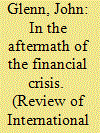| Srl | Item |
| 1 |
ID:
131704


|
|
|
|
|
| Publication |
2014.
|
| Summary/Abstract |
This article examines the financial reforms that have been undertaken through two perspectives on risk: that of Beck's world risk society and an alternative Foucauldian approach. The former argues that, catastrophes such as the recent financial crisis will induce a political shift towards a cosmopolitan form of statehood. Yet, the lack of radical reform since the financial crisis would suggest otherwise. The article therefore argues that what we are witnessing is best understood in terms of reflexive governance in which the various rationalities of risk are reassessed and strengthened in order to avoid a similar occurrence in the future. Moreover, in response to the uncertainty that surrounds such rare events, more intense forms of surveillance have been adopted with the objective of pre-empting any future crisis. Yet, for various reasons, the reforms remain rather limited and the new rationality of pre-emption is unlikely to prevent further crises from occurring in the future.
|
|
|
|
|
|
|
|
|
|
|
|
|
|
|
|
| 2 |
ID:
077879


|
|
|
|
|
| Publication |
2007.
|
| Summary/Abstract |
From the first half of the 1990s, and especially after the accession to European Union in 1995, immigrant authorities and administration have emphasized significance of immigrant associations in integration of immigrants in Finland. The purpose of the associations from the administrative perspective is to socialize and activate immigrant communities and individuals according to basic political rationalities, such as security of the society, happiness of the population and individuals, and cultural pluralism. On the one hand immigrant associations are technology through which integrative government of individuals and communities is implemented. On the other hand, associations themselves are governed through multiple techniques, mainly funding and registration. The author approaches this associational government of integration of immigrants with the "toolkit" applied from Foucauldian governmentality studies
|
|
|
|
|
|
|
|
|
|
|
|
|
|
|
|
| 3 |
ID:
176027


|
|
|
|
|
| Summary/Abstract |
The endeavour to explain and predict international affairs is getting harder since it is ever more widely accepted that heterogeneous and fluid actors are making international politics. Positivists of various types have dominated the discussion on knowledge creation in the discipline of International Relations (IR), but the increasing acceptance of the dynamic character of international politics has led to the support and use of constructivist, post-Western or feminist approaches. There has also been an uptick in methodological discussions on these critical, non-positivist approaches. This article contributes to these debates by offering the first steps towards a cognitive frames–based methodology for IR. With a pragmatist ontology as its foundation, the approach re-sets the focus of analysis to the rationality of the international actors. The article, offers an initial description, by relying on illustrative examples, of the creation, the reach, durability and the organisational structure of cognitive frames in the global arena.
|
|
|
|
|
|
|
|
|
|
|
|
|
|
|
|